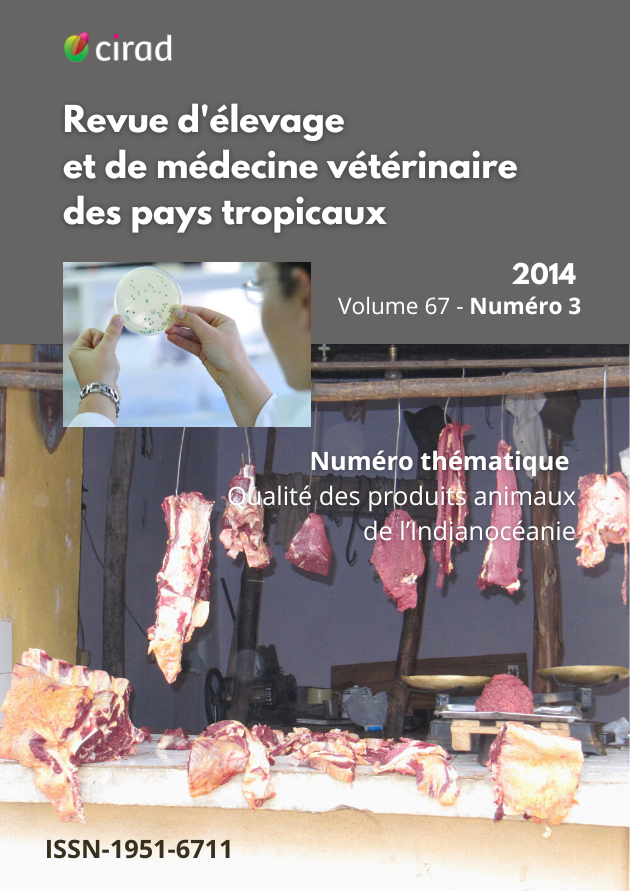Toxoplasmosis and trichinellosis: an epidemiological survey of pig population in Madagascar
DOI:
https://doi.org/10.19182/remvt.10163Keywords
Swine, Zoonosis, Immunodiagnosis, Trichinella, Toxoplasma, MadagascarAbstract
Besides cysticercosis, scarce information is available on the other meat-borne zoonotic parasitoses in the domestic animal population of Madagascar. Trichinella is an intracellular parasitic nematode of mammalian skeletal muscle, causing a serious zoonotic disease. Trichinella is transmitted to humans by consumption of raw or undercooked meat from pig, wild boar and other sensitive species (1). Toxoplasma gondii is a protozoan parasite that can probably infect all warm-blooded animals (mammals and birds) and humans. Humans become infected postnatal by ingesting tissue cysts from undercooked meat (various species), consuming food or drink contaminated with oocysts, or by accidentally ingesting oocysts from the environment (2). The present study aimed at investigating the extent of two major parasitic diseases, namely toxoplasmosis and trichinellosis, within the Malagasy pig population.
Two hundred and fifty pig serum samples were collected during 2010 in the four major slaughterhouses of Antananarivo, the Malagasy capital. Sampled pigs were raised in 11 different regions (of a total of 22 regions) and transported by traders before slaughtering. Samples were stored at -80°C and sent for analysis to the Agence nationale de sécurité sanitaire de l’alimentation, de l’environnement et du travail (ANSES, Maisons-Alfort, France). Serological investigations were conducted for both pathogens using ELISA technique with commercial test kits: ID Screen® Toxoplasmosis Indirect ELISA kit (IdVet, France) and PrioCHECK® Trichinella Ab (Prionics, Switzerland), according to the manufacturer’s instructions.
Results on seroprevalence of T. gondii in pigs confirm that the zoonotic parasite is present in Madagascar. Preliminary results show a seroprevalence of 22.8% (57/250) for toxoplasmosis. All regions are endemic for toxoplasmosis with a frequency of positive pigs ranging from 12% (n = 8) in the southern province of Toliara, to 21% in Antananarivo (n = 69) or Fianarantsoa (n = 79) in central uplands, and up to 33% (n = 69) in Mahajanga in the coastal northwestern region; no region of the island can be considered free of toxoplasmosis. No correlations were found with sex, breed or age of pigs. From a public health perspective these results emphasize the need to inform the public on the importance of proper meat handling and preparation.
Regarding Trichinella, two pigs presented positive values by ELISA based on excretory/secretory antigens but those results were not confirmed in western blot. Even if the serological test for the detection of Trichinella provides a high degree of sensitivity and specificity, false negative results occur during the early stages of infection, especially for light to moderate infection. Further investigations correlating serology and muscle analysis need to be conducted to conclude on Trichinella status in Madagascar.
National field investigations in pig and human populations will have to be carried out to confirm the present results as well as to correlate the observed prevalence with on-farm risk factors, and with the transmission of trichinellosis and toxoplasmosis to Malagasy consumers, especially to pregnant women.
Downloads
Downloads
-
Abstract1115
-
PDF200
Received
Accepted
Published
How to Cite
Issue
Section
Categories
License
© M.Rakotoharinome et al., hosted by CIRAD 2014

This work is licensed under a Creative Commons Attribution-NonCommercial-ShareAlike 4.0 International License.






